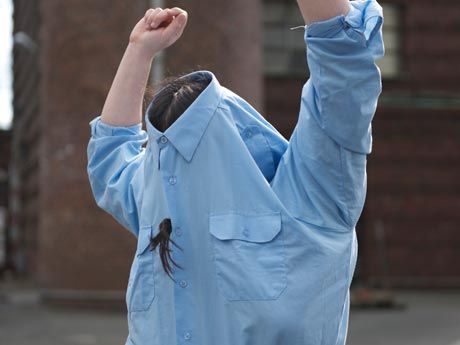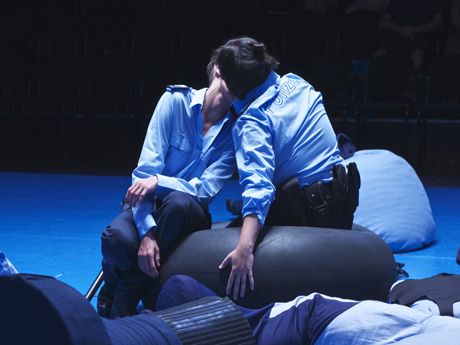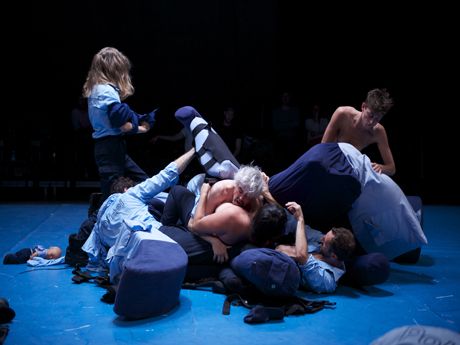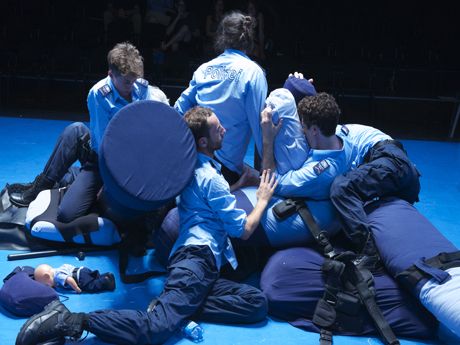Uni * Form (2015)
Simone Aughterlony / Jorge León
Created with and performed by: Simone Aughterlony, Davis Freeman, Nada Gambier, Kiriakos Hadjiioannou, Jen Rosenblit, Hahn Rowe, Gary Wilmes
Concept: Simone Aughterlony, Jorge León
Dramaturgical advice: Saša Božic, Alain Franco
Music: Hahn Rowe
Light Design: Florian Bach
Costumes: Judith Steinmann
Body object design: Marion Montel & Judith Steinmann
Technical Direction: Ursula Degen
Production Management: Michael Nijs, Sina Kießling
Production: Simone Aughterlony - Verein für allgemeines Wohl and Jorge León - Present Perfect asbl
Coproduction:
Zürcher Theater Spektakel, SPIELART München, Kaserne Basel, HAU Hebbel am Ufer Berlin, Charleroi / Danses, Théâtre de Liège, Gessnerallee Zürich, de facto Zagreb, BIT Teatergarasjen Bergen, Théâtre Garonne, Scène européenne Toulouse, House on Fire with the support of the Culture Programme of the European Union
Supported by:
the NATIONALES PERFORMANCE NETZ (NPN) Coproduction Fund for Dance, which is funded by the Federal Government Commissioner for Culture and the Media on the basis of a decision by the German Bundestag, Zagreb City Councile for Culture, Ministry of Culture of Republic of Croatia, Kultura Nova Foundation, Fachausschuss Tanz & Theater BS/BL, Stanley Thomas Johnson Foundation, Stadt Zürich Kultur, Kanton Zürich Fachstelle Kultur and Swiss Arts Council Pro Helvetia.
Special thanks to: UferStudios Berlin and Myriam Van Imschoot
As a group that is granted and exercises discretionary power over society at large, the police corps is simultaneously part of the fabric of society and on the periphery of it, an imposed net that suffocates dissent or expressions of otherness from the normative social frame. In Uni * Form the disguised performers intra-act in a distinct environment that disturbs the established boundaries and unpredictable abuse of distance and touch associated with police control. At the heart of the performance is a play between the domination of desire, the ubiquity of power and a deep interest in human (and non-human) interactions as performers forge ways of negotiating a sense of togetherness and the inevitability of being intimately bound.
The children have left, game is over. The space is scattered with residues of play and confused entertainment. Six adults replace the kid’s presence. They wear police uniform but are not sure of the use they can still make of it.
Irreverent toward the function that the uniform symbolizes, their actions and interactions render a paradox between the familiarity of immediate recognition and the alienation of self-identification. Surrounded and scrutinized by the audience, the uniformed performers are trying to do their «police work». They try, they fail, they try again and find that failure is their style. In unsettling and unsettled instances of embodiment the vulnerability of all bodies emerges and becomes tangible. Power is a force but they have forgotten how to activate it.
The inefficiency of their ‘police work’ takes time and the incorporated gendering of bodies adds to the ambiguity of the appearing and dissolving images. Authority lies in the audience’s gaze but where should they place their sympathy, their antipathy? Abuse is never far away. Sexuality can be empowering but tends to hover in threatening clouds. If we release the police of its own authority what kind of theatre game is at stake: can we open up a mutable landscape in which domination and submission are interrelated forces that resist conforming to a simple binary and like power are practiced rather than possessed?



